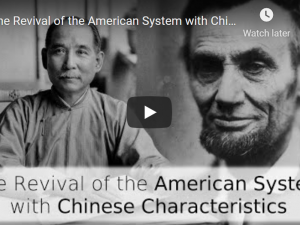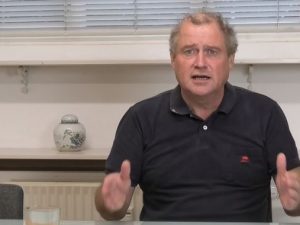
Den franske præsident Emmanuel Macron valgte at indlede sit tredags officielle besøg til Kina i byen Xi’an, en af Kinas ældste byer og udgangspunktet for oldtidens Silkevej; han holdt her en fem kvarter lang tale med titlen: Kinas Nye Silkeveje, en ny betydning og en ny grammatik hen imod en fornyet verdensorden og en drøm for menneskeheden.
Her følger en ikke-officiel, uredigeret engelsk oversættelse, vi har fået fra vores søsterorganisation i Paris:
(Foto: Emmanuel Macron (midt) og hustru Brigitte Macron besøger byen Xi’an i det nordlige Kina, 8. jan., 2018.)
Macron DOCUMENTATION:
Macron Speech in Xian: The New Silk Roads of China, a New Meaning
and a New Grammar towards a Renewed World Order and Dream for
Humanity.
PARIS, Jan. 9 — Macron started his presentation at
Daminggong Palace by describing beautifully the special quality
reached by relations between France and China at some points in
history. (The translations are not official–ed.) “For a long
time, the French nation has contemplated itself in the mirror of
China, a China which brought together thought, poetry, art,
reflections on war, on power, on human life, as well as a world
of imagination around adventures and trips of extraordinary
merchandises and singular discoveries.” The China of merchants
discovering with Marco Polo the treasures of a mysterious and
poorly understood civilization, travelling on those Silk Roads, to
which you give today a new meaning and a new grammar. Imagine
those caravans arriving at the oasis of Dunhuang, treasure of
your civilization, in the midst of sand dunes echoing. Among the
merchandise exchanged also came certain thoughts, words, customs
which rapidly would take over the globe, faster than marching
legions. They brought objects and products which France and
other countries loved. Not the ephemeral time of a fad, but with
the intensity of a discovery that integrated our own historical
patrimony. There is not a royal chateau today that doesn’t have
a Chinese salon, no artists, artisans or engineers who have not
been fascinated by the styles and techniques from China … to
this day because China is a country of inventors and engineers
which is always inventing the future.”
He then attacked the theory that China would be a
“inscrutable continent.” “We need humility, and a long but
respectful and reciprocal dialogue, and friendly curiosity. We
find beautiful what you find beautiful and have a common
attachment to historical sites.” We share a common sense of the
history of the world and of the people. General de Gaulle in
reestablishing relations with China in 1964 made “a choice of
reason,” but also a “choice of evidence.” France and China are
not only two nations, he said, but two civilizations, because
both share a certain conception of man.
Humanity is today at a crossroads, and its future is at
stake, and in this context, China and France “have a common
destiny.”
The key notions around which this relationship must be built
are three: intelligence, justice, and balance.
INTELLIGENCE: We need shared intelligence, he said, to
create a better world and to fight all forms of obscurantism:
Islamic terrorism, blind nationalism which lead to war,
isolationism, a vain attempt to protect oneself from the world.
Intelligence to overcome fears “which exist in Europe
against China. In one generation you had the energy to become one
of the main world powers and now you have the ambition to go
beyond. The rapidity of that change can provoke fears…. The
only way to overcome is to work to understand what the word
‘power’ means for each of us.”
By intelligence, he means more education for all the
citizens, but also a joint partnership on digital technologies
and artificial intelligence. China has 37 million university
students, the Confucius Institutes, artists, massive investment
in new, digital technologies and artificial intelligence. France
is also moving in that direction. “Even though we are known here
for our art of living, gastronomy, and romanticism, we are also a
digital power, energy transition, artificial intelligence,
innovation, research, industry, a financial industry,” stressed
Macron.
We will be stronger if we lead this fight for “intelligence”
together, he stressed, proposing first to multiply cultural
projects such as the permanent exhibit on the Han Dynasty at the
Paris Asian museum, Musée Guimet. Macron proposed also to create
“a great European Sinology institute,” and to found new
partnerships on innovation, digital, and technologies. For this
we need creative individuals, numerous, and free innovation. The
strength of your country, is that you have millions of people who
are creative individuals. Also partnerships on energy
transition, medical innovation, innovation in agriculture and
food industries, to ensure our food sovereignty. Encourage also
the teachings of languages, in particular French.
JUSTICE in the crisis of global capitalism.
The 2nd pillar, is the fight for justice, and first of all,
social justice, said Macron recognizing that China has succeeded
in pulling some 700 million out of poverty in the last decades.
This is a challenge for France, confronted to mass unemployment
but also to the whole world is undergoing a crisis of globalized
capitalism which has led to an explosion inequalities and to the
concentration of wealth, over the last ten years.
JOINT DEVELOPMENT IN AFRICA, overcoming the “unilateral
imperialism France once experienced.”
Macron argued for France and China to work together in
Africa, where China has invested a lot in recent years in
infrastructure, on raw materials with a strong financial strike
force that European nations don’t have. But France has a
historical and cultural knowledge of Africa which are important
for the future. He called on launching projects together there
which are really useful to the growth of the continent,
sustainable financially and not to reproduce the errors of the
past, i.e., creating financial and political dependency under the
pretext of development. Tomorrow the Agence Française de
Développement, and the China Development Bank will sign a
contract on this basis. “France has experienced a unilateral
imperialism which sometimes lead to the worst” and today as these
New Silk Roads are being launched, the partnership between France
and China can avoid those errors.
Macron invited China to join the conference on partnership
in education France is organizing next February in Dakar, Senegal
so to give another face to those Silk Roads where immense work
has been done in infrastructures and economic development.
BALANCE: a new world equilibrium from which China will not
be excluded.
Finally, the last pillar Macron called for is one of
reaching a balance, a kind of new world order from which China
will no longer be excluded.
The histories of both countries have been sometimes made of
“tensions,” of “periods of hegemony,” and of “imperial wills,
each in its own manner, maritime or continental,” he recognized,
stating, however that what unites France and China is their
connection to the world, their claim to universality.
“We live in a world where the equilibrium was thought more
than 60 years ago, at the end of one of the world conflicts we
have undergone, where barbarianism struck at the heart of Europe.
We structured globalization with a notion of international law,
and international structures of which China is at the heart of,
like we, as a permanent members of the Security Council, but
where, I know, China sometimes has the feeling of having been
left outside,” a feeling that “this postwar order is a Western
order not really made for us. And sometimes the Western powers
have contributed to develop that sentiment.”
“We are living today through a crisis of this contemporary
world order which has been weakened by the emergence of
authoritarian powers, because nuclear proliferation has reemerged
and grasping its outlines, and that contemporary capitalism is
being overwhelmed by its own excess and is producing the social
inequalities, I alluded earlier, or the climate inequalities we’re
experiencing.”
In this context, Macron raised the geopolitical problems in
the world, North Korea, international terrorism, the Middle East.
On the Korean crisis, he praised China’s contribution to
help solve the problem and that it has more leverage, but
committing France to a negotiated solution to the crisis. In the
fight against terrorism, he said that he expects terrorism to
rebound in Asia, after having been eliminated in the Middle East.
On these questions, Macron made a {mea culpa} for France and
the West’s role in the destabilizations Libya and Iraq, and
committed himself never to use force against people’s
sovereignties.
“From Central Asia to Southern Asia, there are numerous
threats which can weaken the while continent. It is therefore our
responsibility to fight together against them, building also
political solutions to the conflicts and drawing the lessons of
past errors. I want to say this very clearly: I think there must
be a community of views concerning how to solve those conflicts.
In each country where divisions exist, where authoritarian
regimes are deployed, where sometimes the worst is on hand,
France will not defend military solutions which will act against
people’s sovereignty. We will do everything to work with civilian
societies and with our friends to bring about pluralist political
solutions that will allow all people at the same time to respect
one another, to eradicate terrorism, and also to build durable
political solutions.
“We must draw the lessons of past errors. Every time
we tried to impose the truth or the law against the people
themselves, we were wrong and sometimes even produced
worse situations. Such was Iraq, or Libya today. We need to work
together to develop the respect of sovereignty of the
peoples….” He expressed the wish in this respect that both can
work together toward “inclusive” political situations in Libya or
in Syria in the coming months, and called to jointly fight
against the sources of terrorist financing. This is the aim of a
conference which will occur in Paris in April which is open to
China as well.
Macron called for China and France to define themselves as
powers “for multilateralism,” a notion defied today by a “more
and more straightforward demands for a unilateralism which puts
into question the intangibility of borders, such as in the
annexation of Crimea, or the principle of international law as
was the case in the question of Jerusalem,” i.e., Russia and the
U.S.
“Multilateralism must thus be profoundly reinvented on the
basis of this notion of equilibrium that we have. Some say in
China that the rules presiding over international relations have
been written thus far by the West. To that I respond very soberly
that history sets a frame but does not necessarily impose it upon
us. Our two millenary nations have survived because they were
always able to reinvent themselves, suffer history sometimes,
invent often, accept difficult periods but seize the
opportunities to grow and radiate.”
Against Geopolitics, Harmony
“With the more important place a country occupies, comes
also greater responsibilities. The multilateralism which must be
redefined implies finding balanced cooperation to be invented for
this new opening century. There should be neither a disguised
supremacy, nor a conflict between competing supremacies. All our
art, if I can use that word, will not be an art of war but an art
of balanced cooperation in order to ensure in the geostrategic,
political and economic, level the harmony our world needs.
“If the multilateralism that we have is challenged and if
China wants to engage in this battle, the conclusion is for me
very clear. It is up to Europe and Asia, up to France and China,
to define and propose together the rules of a game in which we
will all win, or we will all lose. I have come thus to tell
China my determination to have the Euro-Chinese partnership enter
into the 21st century with this new grammar we must all define
together. Europe will engage resolutely in this strategy because
it is conscious of its role in the century to come.”
Europe and the Silk Roads
“Europe is back,” claimed Macron, and saying that it is so
“because some of us want to give it a perspective of medium term,
10 to 15 years to rebuild a sovereign, united, democratic Europe
which will be an economic, social environmental, and scientific
power able to dialogue with China and the U.S.” He continued, “We
are working with the German Chancellor, and number of other
European leaders for a project aimed at providing the heart of
Europe with the elements of sovereignty and the year 2018 will be
a turning point in this respect. …
“I want you to understand something today: France is here,
becoming transformed in depth and wants to be that country of
dialogue and construction of a new partnership for the 21st
century with China. With it, Europe is back and wants, through
the building of its own power, to build a balanced cooperation
with China in the coming century.
“It is through honest, loyal and readable dialogue that we
will be able to progress. … It is a trust build by trial and
error methods. It is to decide to make a step, then another and
that we decide together, and that there is no lasting friendship
if it doesn’t follow this road. … It is in this same spirit
that I wish for us to advance on those Silk Roads. Indeed, One
Belt, One Road is the perspective that China gave itself and that
it has proposed to the world. And when a proposal is on the
table, it is not my habit not to discuss it. I understand the
opportunities for China, on the economic level for finding new
markets internationally; on the political level in order to open
up regions hit by underdevelopment; on the diplomatic level, to
stabilize trade in fragile regions where there are states in
difficulty…; on the cultural level since it’s a matter of
exerting a leadership with the force of new ideas.”
The Silk Roads Must Be Shared Roads
“I think that the initiative of the New Silk Roads can meet
our interests, those of France and of Europe, if we give
ourselves the means to really work together. After all, the Silk
Roads, were never purely Chinese, If I’m honest. When we talk
about the Maritime Silk Roads they were first Portuguese. On
land, they went through Central Asia, Iran, Iraq, Tyr, and
Antioch and in so doing they were Sino-European. The genius of
the first Silk Roads was to have reinvented often the European
routes to make the Chinese. … I’m trying to say that those
roads are simply consubstantial, those roads are always shared.
And if they are routes, they cannot be only one sided. They must
go back and forth.”
I Am Ready To Work with the New Silk Road
“I am thus ready to work to the announced objectives. The
programs of road, railway, airports, maritime, technological
along the Silk Roads can bring elements of response to the
deficit in infrastructure, especially in Asia, and to create
perspectives in sectors such as transport, water management,
wastes, durable cities, green economy. The bringing in common of
our financial resources, public and private, for trans-border
projects can reinforce the connectivity between Europe and Asia
and beyond the Middle East and Africa, contribute to better
integrate, structure, open up by trade and growth.
“They will do even better and the city of Xian is the living
example. Those first Silk Roads brought here Buddhism, Islam and
Christianity. Those roads will lead to cultural, educational
exchanges and to profound transformations in the countries they
are crossing. It is a matter of giving ourselves a perspective at
a moment when then shared epical stories, are so cruelly absent
in the world. I must say, it is one of the great merits of those
Silk Roads proposed by Xi Jinping. Those Silk Roads reactivate
the imagination of a new civilization, of fruitful exchanges of
shared wealth and they show to all those who thought that we were
in a tired, post-modern world, where the great epics were
forbidden, that those who decide to live great epics can make the
others dream as well. I believe profoundly on great epical
stories. It is up to France, and with it, to Europe to contribute
its own part of imagination to this proposal and to work at it in
the months and years to come. …
To create balanced cooperation, “I believe that to progress
towards those objectives that we share, we must give ourselves
also the good rules. … They must respond to objectives, that
assign ourselves as common goods. … They cannot be the routes
of a new hegemonism, which would make vassals of the countries
they cross. They must contribute to the intelligence of the 21st
century.” Among the new rules: those of “transparency,
interoperability, opening of public markets, respect of
competition, intellectual property, sharing of risks, that we
deal with already together in the framework of the G20. The
respect for those principles is obviously essential, simply
because they allow for a mutually beneficial partnership, and an
increased financial sustainability and therefore success of the
projects engaged. …
“This will be the object of my exchanges with President Xi
Jinping to define the trust agenda that I want that we put
together.
“I know some will say that this trust agenda must be one to
create an equilibrium between a developed country and a
developing one. But China is no longer a developing country; it
is a country, which is bypassing that largely. And therefore, we
must reinvent here also the terms of a new relationship, and the
Silk Roads are the expression of that new relationship of China
to the world.
“I propose to identify very concretely the political
framework in which we can build that partnership, that
cooperation and common strategy … I am convinced profoundly
that if Europe and China know how to establish that goal
together, … this initiative could be the occasion of
relaunching very pragmatically the multilateralism which is today
lacking in concrete realizations.
“I am ready to play a key role in this direction making sure
that the European countries progress in unity, because China
needs to have a solid interlocutor to exchange and build its own
initiative. I want the Silk Roads to not limit themselves to
economic questions but be enlightened in Europe by a deep
comprehension of China. All the resources must be used to this
end, from the editing world to the world of theater and cinema;
from the French Sinology school, pioneer and recognized, to the
world of arts. You have understood it, my will is indeed, in that
framework, that France and Europe take full responsibility and
meet the proposal offered by China.”
Macron continued that a few days ago he visited the panda
offered by China to Mrs. Macron and other than pleasure he and
his family got from this, he looked closer to see if something
there could inspire his trip to China and he didn’t have to look
for a long time, he says: “His very name enlightened me. The
little panda’s name is indeed Yuang Meng, ‘the realization of a
dream.’ We live in a world where France and China can allow
themselves to dream together.”
Macron: I Will Come to China at Least Once a Year
“Trust is built progressively. I know that also the word for
wisdom in Chinese is ‘to listen.’ Therefore I have decided to
adopt a method: To say things as I said them to you today, to try
define an objective as we will try to do with President Xi
Jinping, and in trust, with method, to listen, to propose, to
progress and build trust.
“At the heart of our two nations, the élan grows, which will
make the world of tomorrow a world at the level of the challenges
of humanity. It is this élan that I want to share with you, tie
with you, build with you. Our grand past gives us an insatiable
taste for the future and this future awaits us. It needs France,
Europe, it needs a China respected and listened to. We are the
memory of the world, it is up to us to decide to be the future.”







